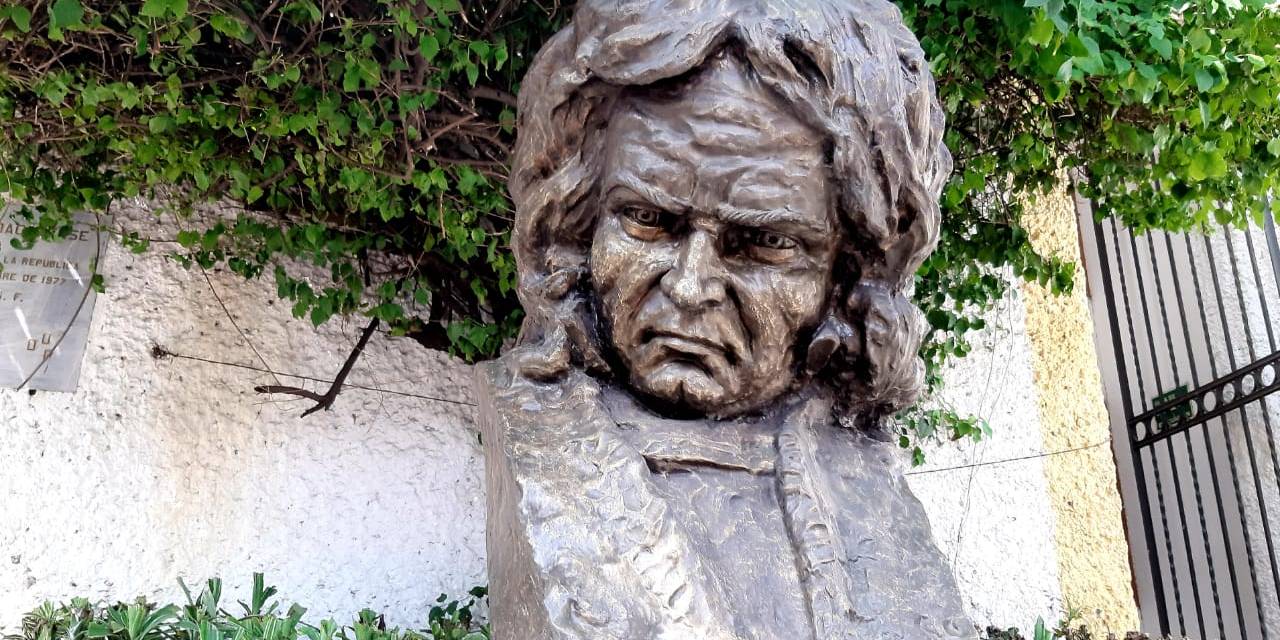Name: Ludwig van Beethoven
Born: 16 December 1770
Died: 26 March 1827
Place of birth: Bonn, Germany
Known for: German composer and pianist; a crucial figure in the transition between the Classical and Romantic eras and one of the greatest composers of all time
Career
It’s hard to overstate the influence Beethoven has had on classical music. Straddling the transitional period between the Classical and Romantic eras, the German pianist and composer is a defining figure in the history of Western music and one of the greatest musical geniuses who ever lived.
His earliest-known work was published in 1783, when he was just 13 years old. Nine Variations on a March by Dressler is a set of nine piano variations, composed the year before being published. Beethoven had been working as an assistant organist to Christian Gottlob Neefe since 1781. Neefe was the court organist in Bonn as well as the young composer’s teacher.
From this time to 1792, Beethoven composed a great number of works, including his first three piano sonatas and two cantatas, none of which were published at the time. It was also during this time that he met someone who was to greatly influence his professional life.
In 1790, Joseph Haydn passed through Bonn on his way to London. The Austrian composer was shown Beethoven’s work and was impressed enough to offer to take the young man as a pupil when he returned from London. Beethoven accepted Haydn’s offer and in the autumn of 1792 he travelled to Vienna. There he studied under Haydn and Salieri, establishing himself as a virtuoso piano player.
Beethoven’s career is generally divided into three periods: the early, middle and late. The first period started with his move to Vienna and is typically considered to last until 1802. The middle period spans 1802 to 1812, and the late period then lasts until his death in 1827.
He was incredibly prolific and wide ranging in his writing, composing some 722 works written over 45 years. He wrote in all the main genres of classical music, including symphonies, concertos, string quartets, piano sonatas and one opera. Some of his best-known compositions include Symphony no 3 ‘Eroica’, ‘Fur Elise’ and Symphony no 9 ‘Ode to Joy’.
Beethoven composed just one opera. Fidelio tells the story of a woman who disguises herself as a boy in order to rescue her husband, imprisoned for political reasons. It wasn’t well received at the time and underwent a couple of revisions before returning to the stage. Today it is considered a classic of German theatre.
Personal life
Beethoven was born in December 1770 in Bonn to Johann van Beethoven and Maria Magdalena Keverich. The actual date isn’t recorded, but he was baptised on 17th and as it was customary to baptise children the day after birth, it’s thought likely 16th was his actual birthday.
The family is best described as ‘downwardly mobile’. Johann was an alcoholic and by the age of 18 Ludwig was the main breadwinner. He was the eldest of his parents’ surviving children. Of the couple’s seven offspring only two younger brothers, Kaspar Anton Karl and Nikolaus Johann, also survived infancy.
Probably the most well-known fact about Beethoven was his deafness. He started losing his hearing at around the age of 26, although he himself dated his hearing loss from a fit he suffered in 1798. By 1801 he was writing to friends about the difficulties of his affliction and was almost completely deaf by 1819.
Beethoven’s deafness didn’t stop him composing. In fact during this time he was writing some of his most enduring works. However, he could no longer perform, which meant he lost a lucrative part of his career.
The composer never married. There were various women with whom he was in love and he proposed marriage to at least one, Josephine Brunsvik, a countess. His feelings were reciprocated but her family didn’t approve of the union. Another prospective bride is thought to have been Therese Malfatti, but again nothing came of it.
Beethoven died on 26 March 1827 at the age of 56 in Vienna. He had contracted pneumonia, from which he never fully recovered. He remained bedridden for months and died from cirrhosis of the liver. His funeral procession three days later was attended by an estimated 20,000 people.
Did you know?
Beethoven’s first music teacher was his father, when the budding musician was just five years old. Recognising the boy’s talent and hoping to turn him into a child prodigy, Johann instigated a harsh, even abusive, teaching programme. Beethoven was flogged, locked in the cellar and deprived of sleep for extra hours of practice. Neighbours told of the small boy weeping while he played the clavier, standing on a footstool to reach the keys, his father beating him for each hesitation or mistake.
Best-known works
Beethoven was an incredibly prolific composer, writing hundreds of pieces in a huge range of styles. Just a few of his better-known works include Piano Sonata No 14 (the ‘Moonlight sonata’), his Third Symphony (‘Eroica’), Fifth Symphony and Ninth Symphony (‘Ode to Joy’), Fur Elise and his one opera Fidelio.
Ode to Joy
Image
It’s hard to overstate Beethoven’s influence. Statues of the composer can be found across the world, with this one at the Foro Cultural Coyoacanense in Mexico (Yael Bonilla, Wikimedia Commons).

